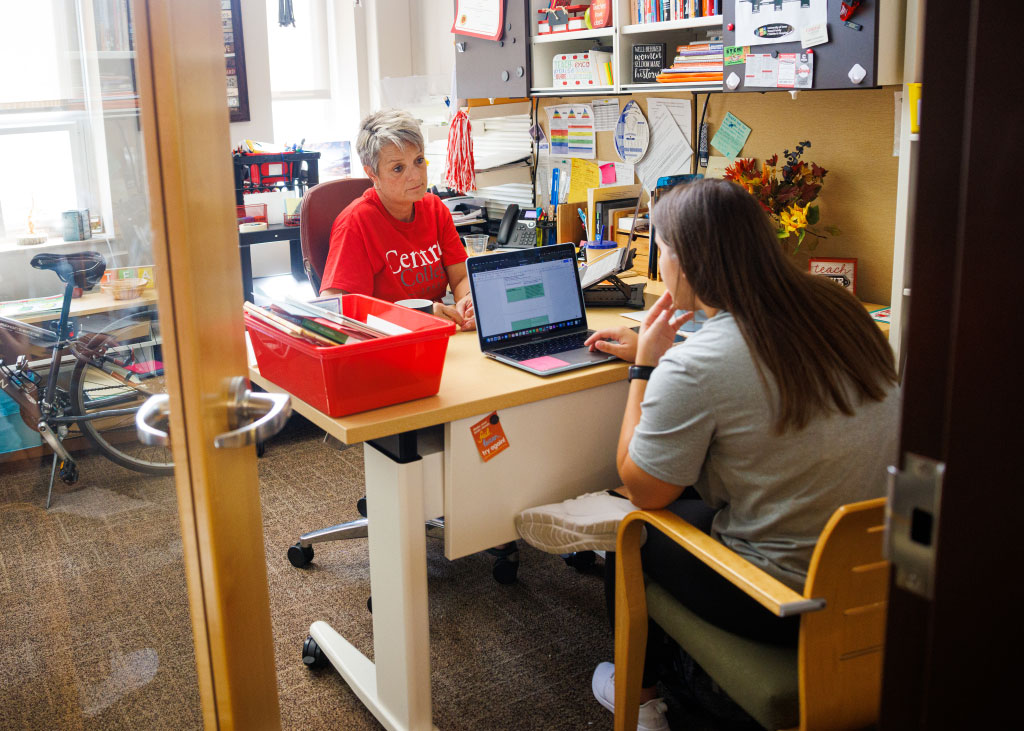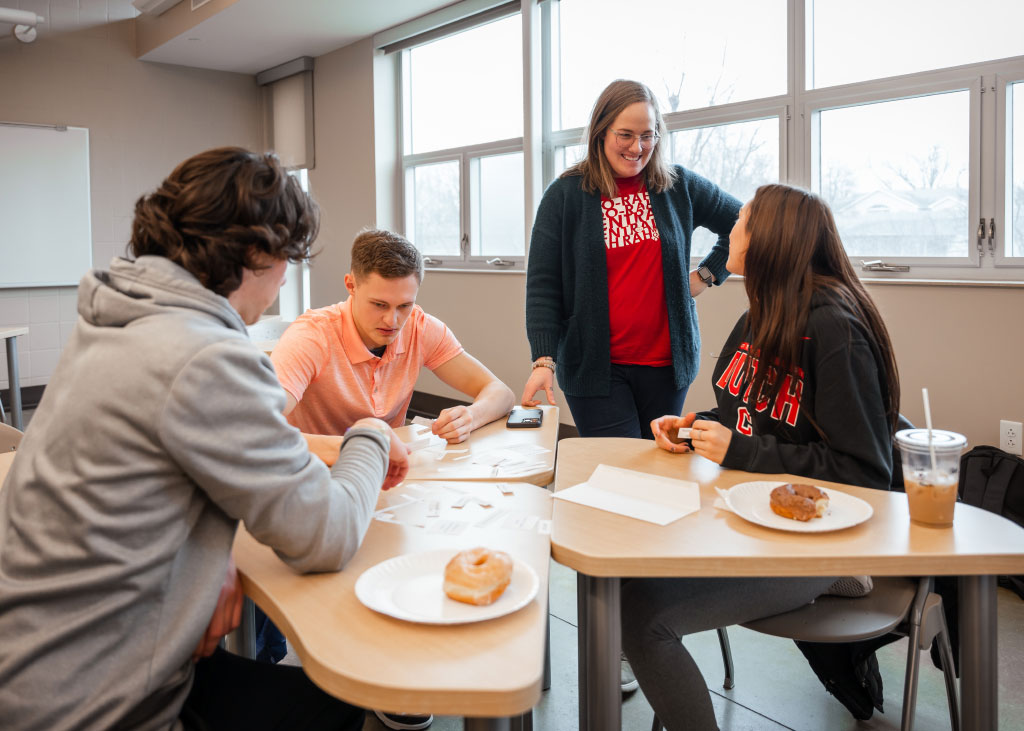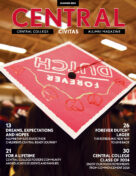
Tammy Strawser, lecturer of education, meets with a student in her office.
Learning to connect with others doesn’t depend on a career path. Interpersonal skills are essential in any profession, and Central College professors infuse their courses with applicable strategies. Three disciplines in particular — education, communication studies and psychology — are exploring relationship building during the 2022-23 academic year.
Community of Learners
Central’s education program produces exceptional teachers because of professors who practice what they preach. Children With Exceptionalities is a foundational course required for admission to the education program. This course provides a deeper understanding of how different students may consume material in the classroom, and it prepares students to work with anyone, regardless of ability, need or background.
“We’re establishing a community of learners,” Tammy Strawser, lecturer of education, says. “If you’re going into teaching, nobody can work in isolation and sustain that. It’s important for students to build a network to learn and grow together.”
The course is designed to bring students from awareness to advocacy. It builds empathy by providing knowledge to look beyond personal experiences to better understand how to support students with different needs.
“What I want my students to take away from the course is how to connect with others,” Taylor Welden, lecturer of education, says. “You can find similarities between yourself and anyone.”
“We are more similar than we are different. I really carry that idea throughout the entire course.”
— Jennifer Diers
Primarily taken by first-year education students, Children With Exceptionalities creates a foundation that students can build on. The professors utilize storytelling to share their experiences teaching students with exceptionalities while creating a space for students to tell their own stories.
“As an intro class, it sets students up to be effective teachers who meet the needs of all learners. Advocacy is key to becoming an effective teacher and person,” Diers says.
“I’m very proud of the work we do in this department with relationship building,” Strawser adds. “We all have great ideas, and we build off that. Because of that, we build good teachers here.”
No “I” in Team
There’s no better way to learn about teams than being part of one. With Mary Donato, lecturer of communication studies, working in a team goes beyond a surface-level experience. Group and Team Communication examines how people work together in teams through informal roles individuals play — often without realizing it.
“The cool thing about Group and Team Communication is the majority of the course will be done in groups and teams,” Donato says. “Not only are we learning about the material, but we’re also enacting it. It’s a 16-week experience of being in a group or team. Almost every class will have some type of activity that’s interactive.”
Students spend the semester in a five-person group, and they collaborate on everything from class activities to homework and exams. The activities in this class bring a deeper understanding of natural relationships.
One activity in particular pushes students to perform informal roles within their team, regardless of how they would naturally act in a similar situation.
“We’ll have a task the whole class must complete, and they have to act out their assigned role. Sometimes someone gets a role opposite of who they are and they’re just itching to do something the whole time,” Donato says. “It’s a fun way to highlight what the roles really look like.”
Students can apply the knowledge from this class to all areas of their life. Currently a communication studies elective, the course provides insight into how to be a better teammate, friend, citizen and person.
“We’re taking a very practical and applicable approach to these types of skills that are essential to any workplace,” Donato says. “Everyone needs to communicate and do so effectively.”

Shelby Messerschmitt-Coen ’15, assistant professor of psychology, works with students during Principles of Counseling.
Full Circle
Shelby Messerschmitt-Coen ’15, assistant professor of psychology, had her first experience with the Principles of Counseling course as a student at Central. Now, as the professor, she’s able to share her passion with students like her.
“As a student, this class was my jumping-off point,” Messerschmitt-Coen says. “It’s a wonderful experience to be back here teaching students what helped me have the trajectory to where I’m at now.”
The upper-level psychology course teaches students interpersonal skills that can be used in helping professions like counseling.
“Not all students in the class want to be counselors, but a lot of them are earnestly invested in relationships and they’re interested in developing interpersonal skills. My training and experience help facilitate their development in that area,” Messerschmitt-Coen says.
The course provides an opportunity to reflect upon oneself to better support others. More than anything, the class challenges bias and assumptions of identity. The work comes down to understanding that the values of a counselor may not align with the values of a client, but that can’t hinder the process.
“I don’t want an assumption to cloud my judgment of you and your goals because you might have very different goals. We all have assumptions and I’m not trying to make students feel bad about who they are and their values. I need them to be aware of how those values might intersect and interact with other people,” she says.
Messerschmitt-Coen acknowledges the challenges for students to look within themselves so they can more easily move past ingrained assumptions.
“They know how to do the hard work. This class challenges them to do the heart work.”
— Shelby Messerschmitt-Coen ’15
For the Love of Others
Each of these three courses explores new approaches to help students connect with others. No matter the discipline, Central graduates are certain to understand themselves and their relationships differently. With a little heart work and an open mind, relationships of all kinds can grow when on a path of lifelong learning.












To encourage serious, intellectual discourse on Civitas, please include your first and last name when commenting. Anonymous comments will be removed.
Comments are closed.